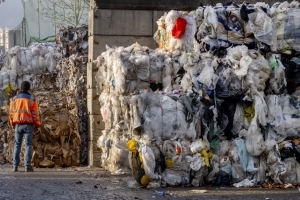Why It’s Probably Better to Throw Plastic in the Trash
 AP
By Ross Pomeroy
AP
By Ross PomeroyMillions of Americans dutifully fill their recycling bins each week, motivated by the knowledge that they’re doing something good for the environment. But the sad fact is that much of what is tossed in the recycling bin is eventually heaped into landfills.
John Stossel brought attention to the issue in a video segment shared on X Thursday morning, to which Tesla and SpaceX CEO Elon Musk replied, “Recycling is pointless.”
While this bombshell might be jarring – especially if you’re someone who dutifully cleans their recyclables before caringly placing them in bins – Thomas Kinnaman, an environmental economist from Bucknell University, says it’s actually not as bad as you think.
As Kinnaman discovered in a 2014 study – a complete life cycle analysis of the recycling process – it doesn’t make much economic or environmental sense to recycle plastic and glass in much of the developed world. Despite claims that plastics are recyclable, really only PET and HDPE (types 1 and 2 in North America) can be readily reused. In total, only 9% of plastic is melted and reformed. The rest goes into landfills or the wider environment.
City Journal science journalist John Tierney pointed out in Stossel’s segment that the economics of recycling have only worsened over time. Both plastic and glass are fairly easy on the environment to produce, but are often very tricky, costly, and intense to recycle. When you factor in all of the water used to decontaminate plastic and glass, the immense distances traversed transporting them (usually by truck, train, or ship), and the mechanical and chemical processes utilized to transform them into new goods, it becomes clear that they are better off in a landfill.
With novel technologies, this situation could very well change, but for now, most plastics should be thrown in the trash, Kinnaman says – though he cautions that his “provocative results certainly require confirmation from future independent and objective research before broad policy goals can be adjusted.”
“Also, many of the benefits and costs associated with waste disposal and recycling vary across regions of the country and world, and thus optimal recycling rates may also vary,” he wrote.
While plastic and glass should probably be crushed and buried in a landfill, aluminum, tin, and paper – especially cardboard – should absolutely be recycled. Just make sure that they’re not overly contaminated with food waste or small bits of non-recyclable waste. Such adulteration can render them unrecyclable.
[…]
The Most Revolutionary Act
- Stuart Jeanne Bramhall's profile
- 11 followers



